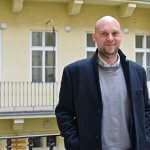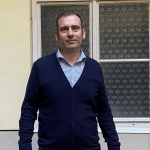Julie Chytilová: People living in poverty do not have the patience and energy to make decisions with a long-term impact

Read an interview with doc. Julie Chytilová, one of the most outstanding and scientifically successful Czech economists from the Institute of Economic Studies FSV UK. The interview was recorded as part of the De Facto podcast. This episode is hosted by doc. Alice Němcová Tejkalová.

Alice Němcová Tejkalová (ANT): Years ago, you and your husband Michal Bauer did research in Africa or India. What did this experience in foreign countries give you in your life? What did you learn in Africa?
Julie Chytilová (JC): We first taught mathematics and English at secondary schools in Uganda as volunteers. And at the end, free discussion hours were the most interesting for both the students and us. It was very interesting for us what the students there asked – for example, do people cry when someone dies in your country? They perceive it in the way that life in Europe is really different from theirs. And then they were surprised that we experience the same things and experience them in a very similar way. When we had been there for almost half a year, someone asked us if we were escaped prisoners. They couldn’t imagine us going there voluntarily, so they thought we were hiding in Africa from persecution. But for me personally, it was interesting to see how they are able to handle everything in the conditions they have there.
ANT: I am fascinated by how you very humbly address topics that are challenging, socio-economic. You may mislead me now, but you approach this environment with great respect. Is that so?
JC: In research, we generally try to understand how people make decisions and behave. And that’s almost always the point. Going back to Uganda, we were specifically interested in how poverty affects how patient or impatient people are, which is a very important ingredient for economic development. When we see a relationship in the data between two variables – between how much income people have and how patient they are – we don’t know which way the relationship is going. We do not know causality, we do not know what is cause and what is effect. And to reveal this is not trivial at all, because in this particular case, with poverty and patience, it can go both ways.
It may be that, as the literature now suggests, that living in poverty leads to people being stressed, dealing with a lot of everyday problems, having to provide for the basic needs of life, and then not having enough energy and strength to pay attention to decisions, which are not so urgent and have a long-term impact. It can lead to them being impatient, not saving enough, not investing in their health or their children’s education. And if we then help them out of poverty once, they can stop making mistakes in important decisions and it can lift them out of poverty in the long term. But it can also be the other way around – that is, someone is simply impatient and therefore does not save, does not invest, thus has a low income and is poor. The goal of our work is to try to unravel in which direction it works, for which we use the methods of experimental economics.
That is, we take a random sample of people and divide them into two groups. When such a sample is large enough, these two groups are statistically very similar. Which we can verify when we ask them about their different characteristics. And then we just observe one group, which we call control group. And the we give some intervention to the second group, which we call the treatment group. And when we see differences in their decision-making or behavior, we attribute them to the intervention.
And in Uganda, we randomly divided local farmers into two groups and measured their patience. But before we did that, the treatment group was tasked with thinking about a scenario where they face a big negative shock to their income. They should have imagined a situation where they have a big crop failure due to the weather and how they would perceive and solve this situation. Then we measured the patience of both groups and saw that those who contemplated living in poverty behaved significantly more impatiently. And from this we conclude that a life of poverty can lead to people being less patient, less thrifty and less invested in their human capital.
ANT: You were also the main researcher of the Economic and Social Determinants of Hostility project, which was financed by the Czech Science Foundation (GACR). So what are the social and economic determinants of hostility? What did you come up with?
JC: One of these projects took place in Slovakia. We looked at how people treat ethnic Roma minorities and people from the majority population. We used a sample of high school students who had the opportunity to make a decision whether to harm someone else. For us, harm or damage does not mean physically, but in the sense that it will reduce his financial reward. And in order to do this, they have to sacrifice a piece of their own financial reward. And when they decide to do that, to us it’s an indication of intolerable behavior.
And there we see that when respondents make such a decision independently or in isolation, they do not discriminate at all. On average, they treat the Roma minority and the majority population the same. And then we allowed another group to observe how their acquaintances behaved. In this context, they are classmates. And when they see their peers behaving, let’s say, peacefully, not intolerantly, they follow that example. When they behave intolerantly, they also follow.
It’s not entirely surprising. It is very interesting, however, that the tendency to follow is significantly stronger when the target of aggression is someone from the Roma ethnic minority. That is, in most situations we do not observe any discrimination when people make decisions independently or are in an environment where their peers behave peacefully. But as soon as the surroundings start behaving intolerantly, discrimination arises. And that can help us explain a few things – for example, why in many countries, historically, different ethnic groups lived side by side perfectly fine, had no signs of tension, and then out of nowhere, intolerant behavior or violence started to spread very quickly.
This may explain why most countries have enacted harsher penalties for criminal acts whose main feature is precisely intolerant behavior towards other groups – because there is a strong potential for such behavior to spread rapidly.
ANT: Your article, for which you received the Bedřich Hrozný Prize, was published in the journal Nature. This research looked at the impact of communicating a consensus among doctors on vaccination against covid-19 on patients’ decisions about whether they want to be vaccinated or not. Throughout the entire covid pandemic, I was very bothered by how little consensus there was among doctors and other professionals about what people should do. What did you come up with?
JC: We were interested in exactly what influences people’s willingness or unwillingness to be vaccinated with a vaccine that was completely newly developed at the time. We felt that a lot of people might have distorted ideas about what the wider medical community thinks. Discussions in the media were often conducted in such a way that there were two experts, one of whom was a very strong supporter of the vaccine and the other a strong opponent. This can lead people to think that even the wider medical community is divided in this way, which is exactly what we wanted to study.
We proceeded in three steps in the research. First, in cooperation with the Czech Medical Chamber, we approached a large number of doctors. In the end, we received answers from ten thousand of them, so the sample was really very large. And there it turned out that there really is a very strong consensus between them. We asked whether they trusted the vaccine, whether they would get vaccinated themselves, and whether they would recommend it to their patients. I feel that on all these questions, more than 95 percent of doctors supported and had confidence in the vaccine.
In the second step, we asked a representative sample of the Czech population what doctors think about the vaccine. There it was a sample of more than two thousand people. It turns out that a lot of people really thought it was 50/50 – that half of the doctors didn’t trust the vaccine and half did. Their ideas were thus very strongly distorted and not accurate at all.
And in the third step, we again divided this sample of two thousand people randomly into two groups using an experiment – again a control and a treatment group. The intervention in this case was simple, but I think, given the number of doctors in the sample, credible and powerful. It was about providing information. We told them what we found among the doctors and described the research.
After that, we observed both groups for the next nine months and repeatedly asked them if they had been vaccinated with the vaccine, given the second or third dose, and so on. We saw that people who got the information even a long time ago, because we informed them at a time when not everyone could get vaccinated at all, were more likely to get vaccinated than people who didn’t get this information. In the group that received this information, 4.5 percentage points more people were eventually vaccinated than in the control group.
Therefore, we believe that this problem with distorted perceptions may be more general. We haven’t tested that yet, but maybe someone else will. It can cover a number of controversial topics, where people may think that the scientific community is divided on the existence or effects of climate change, for example.


